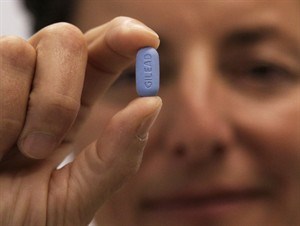
FILE - In this May 10, 2012 file photo, Dr. Lisa Sterman holds up a Truvada pill, an HIV treatment pill used to prevent infection in people at high risk of getting the AIDS virus, at her office in San Francisco. Research showing that the pill does not encourage risky sex and is effective even if people skip some doses was discussed Tuesday, July 22, 2014, at the International AIDS Conference in Melbourne, Australia. The research was published by the British journal Lancet Infectious Diseases (AP Photo/Jeff Chiu, File)
Republished July 22, 2014 - 7:36 AM
Original Publication Date July 21, 2014 - 11:35 PM
There is more good news about HIV treatment pills used to prevent infection in people at high risk of getting the AIDS virus: Follow-up from a landmark study that proved the drug works now shows that it does not encourage risky sex and is effective even if people skip some doses.
The research was discussed Tuesday at the International AIDS Conference in Melbourne, Australia, and was published by the British journal Lancet Infectious Diseases.
It involves 1,600 gay men and transgender women who took part in the original study showing that daily use of the drug Truvada (true-VAH'-duh) lowered the risk of getting HIV.
After the study ended, they were offered the chance to keep getting the pills for free, and three-quarters of them agreed. All were studied for another 17 months.
None who took the pills at least four days a week became infected. Even use two or three days a week lowered the risk of infection compared to taking the pills less often or not at all. Researchers could tell how often the drug was taken because they measured it in blood samples.
"We're encouraged," said study leader Dr. Robert Grant, an AIDS expert at the Gladstone Institutes, a foundation affiliated with the University of California, San Francisco. "There's a demand, there's some forgiveness for missed doses. And it's safe."
Mitchell Warren, who heads a non-profit group that works on HIV prevention research, said in an email from Melbourne that "the story is now clear" that this approach "is real, it works, and it should be made available to people at risk now as part of high-impact combination prevention."
Condoms remain the best way to prevent HIV infection but not everyone uses them all the time, so health officials recommend other options for certain groups, such as gay men.
Some health officials had worried that taking Truvada might give a false sense of security and make men less likely to use condoms or to limit their partners. However, study participants reported no increase in these behaviours, and there was no rise in syphilis or herpes, other sexually spread diseases that might suggest risk-taking.
The study was done in the United States, South America, Africa and Thailand, and paid for by the U.S. National Institutes of Health.
Truvada already is sold for treating HIV. It's a combination of two drugs, tenofovir and emtricitabine, or FTC, made by California-based Gilead Sciences Inc. Its wholesale price is $800 a month in the U.S. but generic versions are available in other countries and they cost as little as 31 cents a day in Africa, Grant said.
"The main challenge is to find a way to make it more available," he said.
___
Online:
AIDS information: http://www.aidsinfo.nih.gov
and http://www3.niaid.nih.gov/topics/HIVAIDS/
News from © The Associated Press, 2014